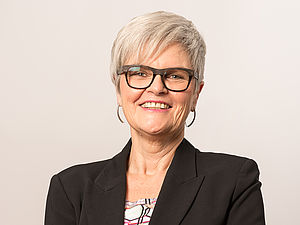Mentally agile - successful on your own initiative
How do you deal with setbacks and how can you break through negative thought patterns? Coach Uta...
Why don't you do the following experiment: write down everything that makes you happy? How long does it take you to feel like you've written it all down?
30 seconds, 1 minute, 3 minutes? ...
And now write down everything that makes you dissatisfied. How long do you come up with something about this? ... Presumably, this will take longer. .
Most of the time it is easier for us to name negative things. Whatmakes us dissatisfied seems to be much more present. Evolutionary psychologists explain to us that in archaic times it was essential for survival to constantly focus on possible dangers. Our brain has learned to process negative information better and faster than positive ones. Scientists call this "negativity bias". In everyday life, this attitude makes us feel permanently in crisis mode and chronically stressed. In fact, the world has always been complex and challenging.
from VUKA to BANI
While since the end of the 1980s the acronym of the VUCA world (Vulnerability, Uncertainty, Complexity, Ambivalence) has made the non-linear changes clear to us , we now see ourselves in rather chaotic developments and this is what a new acronym stands for: BANI (Brittle, Anxious, Non-Linear, Incomprehensible – i.e.: brittle, anxious, non-linear and incomprehensible, even incomprehensible).
The American futurologist and author Jamais Cascio presented this new acronym in his article "Facing the Age of Chaos" in April 2020.
How satisfied are the people in your team now?
"We are aware of the fact that there are fears that we will have to deal with inflation and completely new challenges. We can't know what's in store for us in the future, but we make ourselves feel positive and work together to grow with the challenges in order to swim upstream and emerge stronger. "
These would be the messages a CEO would send to his team in a strategy meeting at the beginning of 2023.
When big messages are announced in strategy meetings, the audience is often left with a skeptical feeling. Doesn't experience say that the fire and emotions of such speeches quickly fizzle out? Why should this time succeed what has already started several times with a lot of hope and has come to nothing? (Negativity Bias)
Many managers are also struggling with the current circumstances and would like to have confirmation from their teams that they are facing the current reality with self-reliant competence, creativity and commitment. This is exactly what the employees in the team want from their managers. If expectations are disappointed, mutual trust dwindles, dissatisfaction arises and a series of conflicts can occur, which in the worst case are then carried out at the relationship level.
However, development does not happen through individual miracles or happy coincidences, but through Sustainability in change efforts.
What must therefore come after the message are development steps through open communication and the will to change on the basis of trust and security. "Itrust" and be willing to engage in a debate needa stable foundation. Progress happens through friction in terms of content, and we dare to do so when there is a stable foundation. The now established term for this is "psychological safety". The term does not mean the absence of substantive debate and it does not mean an uninterrupted "feel-good atmosphere". And as always in communication, the process is reciprocal.
So how can a team establish this kind of security in the BANI world?
There needs to be room for conversations and trying out new practices. It takes the courage to do things, despite our perceived skepticism and a veiled expectation of failure. It also takes the courage to let go of things that actually do not move us forward, even if they have become dear to us.
Building "Collective Wisdom" through meaningful conversations with external support. Team Coaching to strengthen alignment and collaboration.
That's our recommendation as experienced TeamCoaches.
Team Coaching means, in a protected setting, with agreed rules and with external support, clearly naming events and pain points, taking a look at the real team dynamics and bringing critical issues out from under the carpet.
It means a coordinated definition of satisfaction, belonging, and collaboration. Instead of blaming the BANI reality or the difficult environment, the common creates a collective map to wander through the unknown territory.
Thus, true collaboration, efficiency, and as a result, customer satisfaction can develop.
The good news is that it can succeed this way – the more difficult news is that a team is never done with it and this process only has a chance if it is driven continuously.
Good questions for important conversations are:
Team Coaching comes in different forms. Whether regular meetings lasting several hours or full-day workshop formats, in presence or online, at a suitable location in the company or offsite - the form is chosen according to the respective needs.
Keeping the process of interacting with each other – this applies to a TeamCoaching workshop as well as to the exchange in a company as a whole. Satisfaction arises when such discussions can be held and organizations honestly face up to these internal development processes.
How satisfied are the people in your team at the moment?

Gabriele Maier-Güttler is a coach and entrepreneur.

How do you deal with setbacks and how can you break through negative thought patterns? Coach Uta...

I'm top prepared. I hope the interview goes well - but will I reach my interview partners?" The...
Leave a Comment